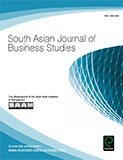 A business journal has retracted a 2016 paper about how social media can encourage young consumers to become devoted to particular brands, after discovering flaws in the data and findings.
A business journal has retracted a 2016 paper about how social media can encourage young consumers to become devoted to particular brands, after discovering flaws in the data and findings.
The paper—published in South Asian Journal of Global Business Research, now called South Asian Journal of Business Studies—was retracted in June 2017, after the journal learned of flaws that called the “validity of the data and reported findings” into question.
Here’s the retraction notice for “Evaluating the influence of social media on brand sacralization: an empirical study among young online consumers”:
The publisher wishes to retract the article “Evaluating the influence of social media on brand sacralization: an empirical study among young online consumers” authored by Payel Das and Santanu Mandal, in South Asian Journal of Global Business Research, Volume 5, Issue 3, 2016. It has come to the attention of Emerald that subsequent to a corrigendum to the article (South Asian Journal of Global Business Research, Volume 5, Issue 3, 2016) the validity of the data and reported findings in this paper are flawed and cannot be independently verified. The authors and South Asian Journal of Global Business Research sincerely apologise for this error.
The paper has not yet been cited, according to Clarivate Analytics’ Web of Science.
A spokesperson for the publisher, Emerald Group, told us:
… the journal editors were made aware of concerns surrounding the methodology and findings. The authors were provided with opportunity to defend the work but were unable to support their findings with a tangible dataset. A decision to retract the paper was made by the journal editors.
The spokesperson added:
The authors were consulted on the decision and they approved the accompanying retraction notice.
The paper’s corresponding author, Santanu Mandal, gave Retraction Watch what appears to be a slightly different characterization of what went wrong:
there were some human calculation errors noted post publication [and] so we retracted.
We’ve followed-up with Mandal and the publisher to try to clarify, and will update if anyone responds.
Mandal is an assistant professor at ICFAI Business School Hyderabad in India, and the other author, Payel Das, is an assistant professor at the Symbiosis Institute of Media and Communication in Pune, India.
The paper had already received a corrigendum because the authors had omitted a 2011 study from their analysis. It is unclear when the corrigendum was issued. According to the notice, the authors included the missing source and subsequently modified some of the methodology and data.
Here’s the corrigendum, which we could only access within a copy of the the full study, still paywalled:
It has come to the attention of Emerald Group Publishing that the EarlyCite version of the paper “Evaluating the influence of social media on brand sacralization: an empirical study among young online consumers,” published in South Asian Journal of Global Business Research, Vol. 5, Issue 3, 2016, did not fully attribute one of the sources drawn upon. This was: Hong, I. B., and Cho, H. (2011), “The impact of consumer trust on attitudinal loyalty and purchase intentions in B2C e-marketplaces: Intermediary trust vs. seller trust,” International Journal of Information Management, Vol. 31 No.5, pp. 469-479.
Referencing and bibliography have been expanded to reflect this source and to support the methodological approach applied to goodness of fit index (GFI) and root mean square error of approximation (RMSEA) thresholds (see Section 4.3 “Reliability and validity”). Subsequently, data in the “Goodness of fit test” (Table IV) has been updated to the correct degree value of 242. These oversights occurred through author error and have now been corrected in the published, electronic version of the paper. The authors sincerely apologize for the oversight.
The paper builds on previous work exploring how social media can influence the ways in which young online shoppers perceive brands, as well as their likelihood to purchase those items online. The authors surveyed over 200 young adults in Asia to establish a model for how social media influences what they call, “brand sacralization” — when consumers consider brands to be “sacred entities.” The authors claim that their “study is the first to develop a measurement instrument for brand sacralization” and is “the foremost in developing measures for social media interaction and social media usability.”
Like Retraction Watch? Consider making a tax-deductible contribution to support our growth. You can also follow us on Twitter, like us on Facebook, add us to your RSS reader, sign up on our homepage for an email every time there’s a new post, or subscribe to our daily digest. Click here to review our Comments Policy. For a sneak peek at what we’re working on, click here.